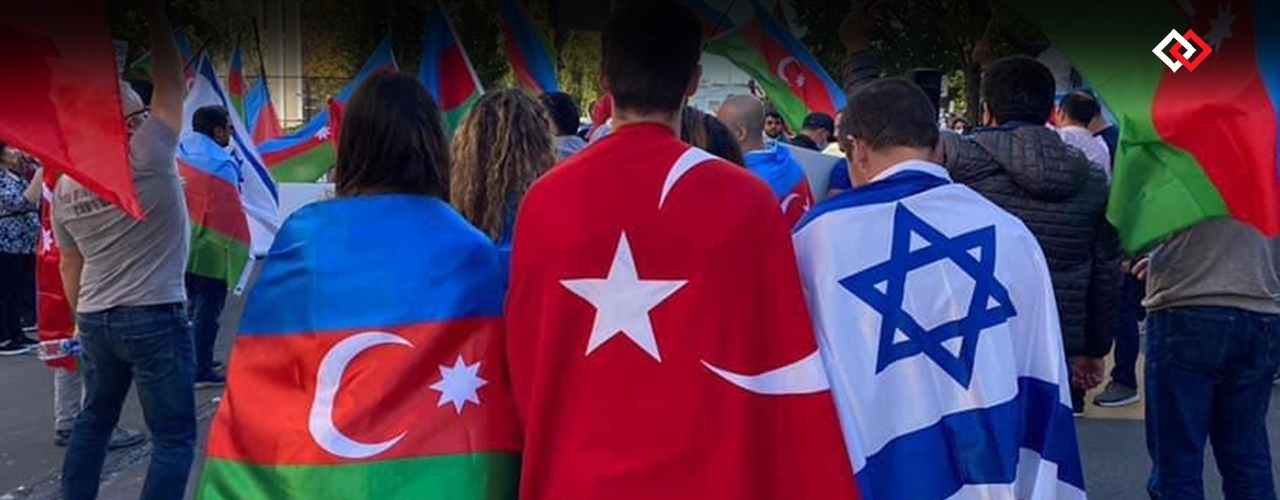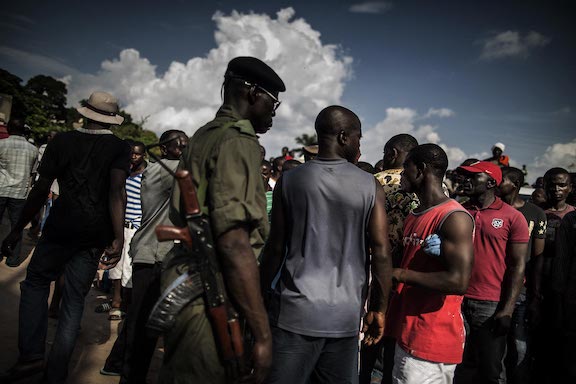The degradation of Armenia’s national security structure (as well as the crisis of political confidence) is often attributed to the defeat in the 44-day war; while the defeat contributed to both, it did not cause either. It exposed a problem which has much deeper roots. Almost all systemic and structural political and military weaknesses of the Republic of Armenia share a fundamental root cause, which is the chronic absence of a culture and tradition of Statehood, both in the mindset of the political leadership and in the general public. This, in turn, is rooted in the absence of a cohesive political culture in the country, where a generally apolitical public, focused primarily on individual political leaders and their record, and fixated mainly on how that record affects their personal lives, has little or no appreciation of a broader, national, issue-driven political process and purpose.
The absolutism of State interests, which is a key guiding principle for most successful sovereign states, has been absent from the political thought process of successive governments of Armenia since independence. In many countries, during the formative years of their Statehood when they lack the requisite institutional depth, it has fallen upon visionary leaders to define, articulate, and defend State interests. This top-down process never took place in Armenia.
The political leadership viewed its function more as a privileged pastime than the hard, tireless, unglamorous, and thankless work of building a State from scratch, with all the requisite institutional building blocks, security measures, diversified strategic alliances, and the necessary steps to establish defensible sovereignty. It also invariably mistook the interests of its “rule” or its power base (իշխանութիւն) with those of the State.
While all governments pursue their own interests, many also recognize the distinction between the interests of the State and their more parochial ones. Realpolitik is shaped by the relentless pursuit of State interests. Even some of the most corrupt governments have managed to protect their sovereignty by recognizing a critical red line of State security which they do not allow their corrupt practices to cross. When Statehood is endangered, parochial and personal interests are temporarily put on the back burner, while the danger is brought under control. In this single-minded pursuit of State interests, governments do not hesitate to circumvent or violate principles, values, ideology, even certain legal restrictions in order to protect the supreme interests of the State. That’s why some of the most unlikely strategic alliances between countries which are ideologically diametrically opposed and have no shared values are established and sustained, as long as those alliances serve the interests of their respective states.
In March of 2021 I published an article in which the causes, consequences and possible remedies of the absence of the culture of Statehood were discussed. Here I will try to expose additional consequences of the same syndrome, focusing largely on the prevailing post-defeat public attitudes and government policies.
Realism versus Defeatism
By far the worst enemy after a military defeat is defeatism. Defeatism becomes particularly deadly when it appears in the guise of “realism.” The wrong and most dangerous lesson to draw from our defeat is that it was inevitable, that we could never overcome the overwhelming international acceptance of Artsakh as part of the territorial integrity of Azerbaijan, that we did not have the diplomatic and legal bases and resources to reverse or at least modify that perception, that 30 years were not sufficient time to make progress in that area or to strengthen and modernize our defenses, that the Armenian nation as a whole did not have the resources to consolidate and “own” its victories of the 1990s. Consequently, since the defeat was inevitable, realism dictates that we accept its outcome and all its implications.
What is realism in politics? Realism in assessing the present is relatively easy. It is based on the prevailing observable facts. A prudent and pragmatic politician can even put aside any interference from emotions and prejudices and accept facts as they are: We lost a war, we lost thousands of lives, we lost hard-captured territory, we lost considerable geopolitical and diplomatic credibility, we lost significance as a sovereign State, and we are militarily weak. In a nutshell, that’s a realistic assessment of the present.
The difficult part is to realistically assess the future because realism of the future is not based on events that have just occurred, but on someone’s vision of what is realistic to achieve in the future. To assume that today’s realities will be the realities of tomorrow, that we have no power to shape or change them, that external circumstances either do not change, or, as they change, they do not present opportunities for changing one’s circumstances, is not realistic. It is defeatist. It lacks the vision and ambition to pragmatically shape a different future than the present. No political leadership can serve the nation it leads with a static mindset, because having a realistic vision for the future and the determination to pursue that vision are prerequisites for effective political leadership.
This raises an important question: who decides what’s realistic in the future? The famous quote from Otto von Bismarck, “Politics is the art of the possible,” is often cited to augment the call to realism. But few ask, “possible” according to who? Or realistic according to who? Would Sardarapat have been deemed realistic a year before it was fought? Would any of today’s “realists” have considered the establishment of an independent Armenian Republic realistic a year before May 1918, when the Armenian nation had suffered its biggest human and territorial losses? Who would have deemed the liberation of Shushi or the seven regions around Artsakh thirty years ago realistic?
The point is, transcending from the realism of the present to that of the future is based on vision, judgement, imagination, ambition, daring, courage and, perhaps most critically, purpose. And therefore, that process is not absolute. The irony is that only those who can dream can be realistic about the future. Those who cannot dream simply project the present into the future, because their mind cannot see past the present.
If the wrong lesson to draw from our defeat is that it was inevitable, what is the right lesson? Here is one realistic answer: We lost the war because successive governments did not understand, let alone value, the Supremacy of Statehood; because from the early days of independence, the Republic was, by design, built on a weak foundation, especially from the perspective of national security; because from the beginning the government dismantled whatever intelligence gathering capabilities it had inherited from the Soviet Union instead of building on them; because in the immediate aftermath of the collapse of the Soviet Union we chose not to put the formidable scientific resources of Armenia in the service of national defense; because right after the victory and the Bishkek ceasefire agreement of 1994 we did not consolidate our gains through international legal measures and through intensive, deliberate and goal-oriented diplomacy to secure the status of Artsakh and reverse the prevailing international acceptance that it is an integral part of Azerbaijani territory; because we remained intoxicated with our victory far too long and failed to upgrade our military; because we spent the last 28 years in complacency and corruption, oblivious of the fact that we were constantly crossing the red line endangering the interests of Statehood; because, settled nicely in the comfort zone of the present, we did not formulate a clear and attainable vision of an economically advanced, militarily defensible, prosperous Armenia and Artsakh, nor had enough dedication to our Statehood to pursue such a vision; because Armenia’s political and military leadership happily lingered in the tired assumption that Armenia could always rely on an external guarantor of its security, ignoring the ways in which the world, the region, and the circumstances of that presumed guarantor were changing; because we did not invest in our capabilities and in strengthening the country, and our political leadership throughout independence, taking the prevailing status quo for granted, was more interested in enriching itself than in building the state and populating all of the territories under Armenian control…
…and because during the war we did not act with resolution and determination to win; because the war was fought with a fraction of our true capabilities and with mind-numbing strategic mistakes; finally, because as much as the thousands of lives, Sovereign Statehood (as distinct from the survival of the regime) was intrinsically dispensable in the mindset of the government. Harsh as this assessment may sound, it is nonetheless a realistic one.
Security through Peace
The central policy objective of the “era of peace” declared by the Armenian government is the eventual attainment of National Security. The idea is disarmingly simple: If we agree on our borders with our enemies, and sign a peace agreement with them and open the channels of communication and trade, we will eliminate the threat of future military aggression, and live and prosper in peace. What could possibly go wrong?
Of course, the problem is that that’s not how the world works. And that’s especially how the world does not work given the nature of our enemies. Our enemies will not show good will in peace, anymore than they showed magnanimity in their victory during and after the 44-day war. Security is not and has never been a consequence of peace. The reverse is much more true. A strong national security can make peace possible, but not the other way round.
The only way to attain national security is through strength. Strength in the broadest sense of the word: strong, modern, and technology-driven military, competent governance, superior intelligence, diversified and mutually beneficial strategic alliances, goal-oriented precise multilateral diplomacy, being at the forefront of the information war, and an advanced and competitive economy. National security cannot be outsourced, nor can it be relegated to the good will of the enemy, let alone an aggressive enemy with genocidal objectives.
Seeking peace as a means of achieving security, without pursuing these objectives, as if peace was a convenient shortcut to security that would make it possible to avoid all the hard work of building it block-by-block through necessary functions of a Sovereign State, is the ultimate naiveté and utter neglect of realpolitik.
It is also the direct consequence of not understanding, let alone valuing, the supremacy of State interests.
The Never-Ending Discourse on Engaging the Diaspora
I first visited Armenia 33 years ago, in December 1989, on the first anniversary of the devastating Gyumri earthquake, when Armenia was still part of the Soviet Union. During that visit and ever since, I’ve heard and participated in countless discussions about engaging the Diaspora in the development process of Armenia. “Engaging the Diaspora” has meant different things to different players; with respectable exceptions, most discussions have been little more than lip service. Not surprisingly, the progress has been lackluster at best.
There are many legitimate causes for the failure of a more meaningful engagement between the Diaspora and the Armenian government, ranging from an understandable clash of cultures to differences in visions and expectations from each other. There are also less legitimate causes, largely related to opportunistic tendencies to exploit and inadequate effort to understand.
But ultimately, it was (and is) incumbent upon the government of the Republic of Armenia to adopt a deliberate policy of engaging the vast talent and resources of the Diaspora to further the interests of the State. After all, 75-80 percent of the resources of the Armenian nation are in the Diaspora—number of people, education levels, professional qualifications, financial resources, experience in management and administration, competency in science, medicine and technology, global connections, experience in military and strategic affairs and in intelligence operations.[1]
Any government truly interested in furthering the interests of the State would have gone to extreme measures to lure this capacity into the service of the State. But successive governments since independence have done the opposite, introducing legal and even constitutional hurdles preventing the Diaspora from serving in high offices of the government.
The resistance to engage the Diasporan resources is so engrained that it has gone beyond legal hurdles. While internships and beginner-level positions have been encouraged, higher positions in the Executive and judiciary branches are almost non-existent even if not prohibited by law. Competencies and qualifications from the Diaspora are seen as an unwelcome interference in the comfort zone and established ways of the political elite, leading to a chronic resistance to power-sharing in all Administrations since independence, primarily to protect vested parochial interests, to the detriment of national and State interests.
This too is the direct consequence of not understanding, let alone valuing, the supremacy of State interests.
* * *
The symptoms of not being guided by the supreme interests of the State are many. Without elaboration, I’ll list just a few: The sorry state of the armed forces is one—from all indications, the capabilities, morale, and leadership structure of the armed forces have deteriorated since November 9, 2020. Any government that understood the supremacy of State interests would have made the strengthening and modernizing of the armed forces its top priority after November 9. In fact, if we believed in our Statehood, a comprehensive militarization of the country and the nation would have been our number one priority.
The utter neglect of the country’s education system is another. No government concerned with the supreme interests of the State would make the average salary of a schoolteacher more than 6 times lower than the average salary of a policeman, not counting the regular bonuses offered to the police force. The sorry state of the internal political discourse in Armenia is yet another. I shudder each time I peek at social media. The factions have moved beyond accusing each other of all the ills of country while denying any responsibility and accountability of their own; now their cronies have started a wave of name-calling, mudslinging, and such obscene profanities that it is truly impossible to believe that anyone involved in that chatter is genuinely concerned with Armenian Statehood.
Message to the New Generation of Leaders
There is only one short-term solution to this deep-rooted crisis. It is the emergence of a new generation of political leaders who intrinsically understand and value the supremacy of State interests. Such a generation has to have the same courage and selfless dedication as the founding fathers of some of the most unlikely states—such as Singapore, Finland, Israel, to name a few—who faced even more formidable impediments during the founding of their sovereign states than Armenia has faced. When a new generation of political leadership emerges which views its role not as a privileged pastime that comes with attractive perks and benefits, but as the truly thankless and dedicated work of building a sustainable sovereign State, then perhaps Armenia will finally be able to develop a professional cadre of civil servants, with a keen sense of civic duty, which has not existed in successive Administrations since Independence. So far, with rare but respectable exceptions, Armenia’s civil service has simply reflected the attitudes of the political leadership. Only a fundamental attitude change at the highest levels of political leadership can finally install a sense of duty, pride, and excellence in civil service.
The biggest deficits in the years since independence have been the political will, vision, faith in our Statehood, and a sense of national purpose that recognizes the supremacy of State interests, beyond empty rhetoric, and accepts the responsibility to take the countless thankless practical steps to achieve it. That is why, bolstering the Sovereignty of the State, a central tenet especially in relatively newly established States which lack institutional depth, has not been a consideration in Armenia. Unless this gap is filled, all other remedies, even when they bring noticeable marginal improvements in various aspects of the economy and governance system of the country, will remain window dressing.
The longer term and more fundamental solution is the complete overhaul of the educational system and the deliberate, methodic building of state institutions. But these cannot be done without a catalytic driver, which has to be the short-term solution described above. The combination of these short- and long-term measures could revolutionize the culture and practice of civil service, thus transforming both the structure and modus operandi of the government. Only then Armenia will have a chance to finally uproot the post-Soviet oligarchic system and replace it with an effective, functioning State.
Article by Vahan Zanoyan, published in EVN report on June 27, 2022
[1] By “Diaspora” I do not understand only ethnic Armenians living outside Armenia with little or no connection to Armenia, but also citizens of the RA who migrated and acquired foreign citizenship and currently reside abroad, ethnic Armenian citizens of foreign countries who acquired their Armenian citizenship since independence, and ethnic Armenian citizens of foreign countries who have not yet acquired citizenship of the RA, but are qualified to acquire it under the current laws of the RA.





